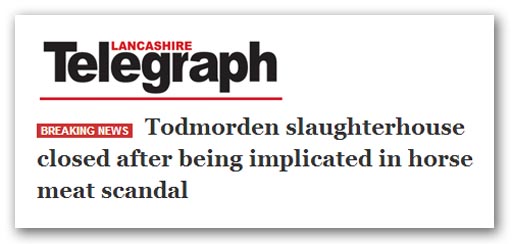This is the Cross Stone Abattoir, licensed to Peter Boddy, which was raided simultaneously with a licensed cutting plant in Dyfd, trading under the name Farmbox Meats Ltd, owned by sole shareholder Dafydd Raw-Rees, who is said to have been supplied with horse carcases by Boddy. Dyfed-Powys police entered the cutting plant with FSA officials.
Both could be described as "fringe operators", with no obvious business affiliates, although Boddy runs an "animal capture" business locally. He denies he has been raided, and says he has simply been asked to provide information to the FSA. Nevertheless, operations at both units have been suspended while investigations continue. All meat found has been detained and paperwork has been seized, including customer lists from the two companies.
The raids came after FSA director of operation Andrew Rhodes had ordered an audit of all horse-producing abattoirs in the UK, after the news of horsemeat adulteration first broke. He says he was shocked to uncover what appears to be a blatant misleading of consumers.
Rhodes may well be shocked, as the abattoir is subject to full-time supervision by FSA inspectors, while the cutting plant is also subject to routine inspections. Both are licensed by the FSA. It is not only consumers who have been misled, it would appear.
Furthermore, after all the focus on Romanian slaughterhouses, especially by The Daily Mail which has keen to pin the blame on "zee feelthy foreigners", there should be some red faces around - not that there will be.
One of those should be Conservative MP Mark Spencer, who in today's debate discounted the possibility of meat substitution taking place in the UK, saying: "Frankly, that could not happen in the UK because environmental health officers and trading standards officers are checking a paper trail that goes right back".
"Given the traceability in the UK industry", he said, "the opportunity to change those labels is simply not there. Registered vets in every abattoir in the United Kingdom are watching the line and checking that the carcases are stamped and marked. They cannot be changed. When one buys what is basically a block of frozen meat from an international buyer, it is easy to pull off the label that says 'beef' and slap on one that says something else, or reverse that process. That is a sad state of affairs".
The naïvety of such people is one of the reason why the finding of horsemeat in British premises is potentially a game-changer. Ostensibly, it illustrates the widespread nature of the food adulteration, and breadth of the malpractice. Rhodes confirms that the horsemeat has been used in burgers and kebabs, adding an entirely new dimension to the current scandal, which so far has involved only imported food.
Speaking personally, I am not at all surprised, having seen evidence personally of deliberate mislabelling in British premises, and taken evidence from British plant operators that have done it. The BBC interviewer asks whether adulteration has been "going on for years", and the answer is, of course, yes. Where there's brass to be made, there will always be scallies.
Nevertheless, there have been no charges yet, and Rhodes may be seeking to cover his back. He is arguing that we have a "very robust" system of control, but then it never was. The trade has run rings round the flat-footed FSA inspectorate ever since it was set up. Nothing has changed, and nothing will change until these people learn something of how to police the food industry, a skill they have never really learned.
Speaking personally, I am not at all surprised, having seen evidence personally of deliberate mislabelling in British premises, and taken evidence from British plant operators that have done it. The BBC interviewer asks whether adulteration has been "going on for years", and the answer is, of course, yes. Where there's brass to be made, there will always be scallies.
Nevertheless, there have been no charges yet, and Rhodes may be seeking to cover his back. He is arguing that we have a "very robust" system of control, but then it never was. The trade has run rings round the flat-footed FSA inspectorate ever since it was set up. Nothing has changed, and nothing will change until these people learn something of how to police the food industry, a skill they have never really learned.
